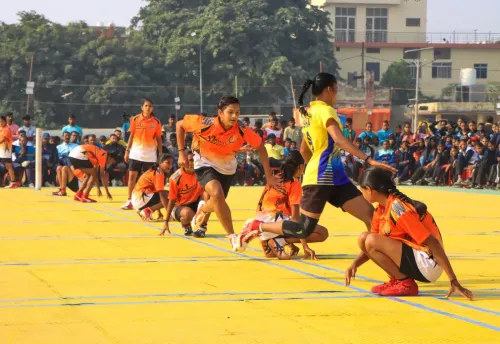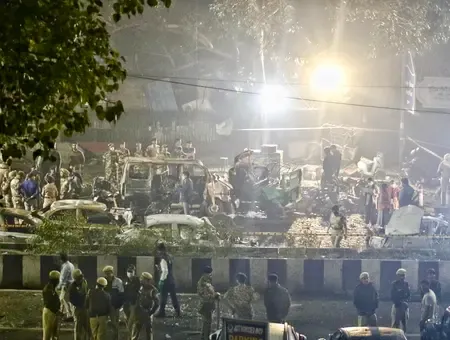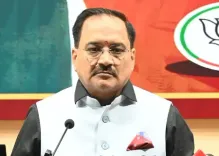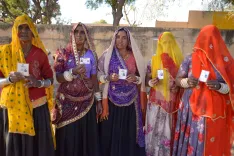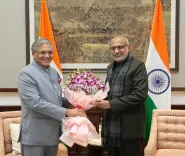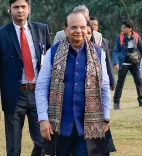What is India's strategy in the current geopolitics?
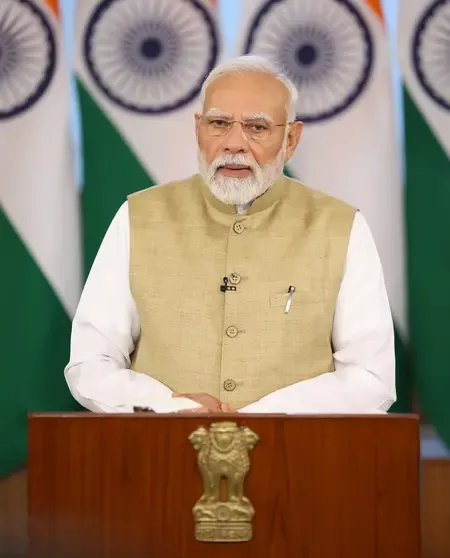
Synopsis
Key Takeaways
- India must maintain flexibility in its geopolitical strategy.
- Balancing relationships with the US and Russia is crucial.
- China's influence in the region needs to be countered.
- Middle East conflicts pose risks to regional stability.
- India advocates for a multi-polar world order.
New Delhi, July 13 (NationPress) The global landscape, as perceived by India, is currently characterized by a hesitancy instigated by US President Donald Trump in the United States' relations with both India and Pakistan. Additionally, there is an increasing influence of China over India's neighboring countries, along with a pressing need for India to maintain Russian supplies in defense and energy sectors. India faces the challenge of sustaining its active presence within both BRICS and QUAD, amid revelations of Chinese military assistance to Pakistan during military tensions that arose after the Pakistan-directed terrorist attack in Pahalgam. The ongoing turmoil in the Middle East and the potential for India to emerge as one of the world’s leading economies also play critical roles in this dynamic.
The current geopolitical climate is precariously balanced, resembling a prelude to a new Cold War, largely due to an existing rapport between President Trump and Russian President Vladimir Putin. International developments keep the global scene in a state of flux, necessitating that India's national strategy be adaptable to these conditions.
Defining India's strategic paradigms is not overly complex. Adapting to President Trump's somewhat unpredictable governance style, which favors Executive Directives, is vital. His mandate of 'Make America Great Again' (MAGA) and the policy of 'America First' are influential in both domestic and foreign policy, including trade and tariff issues. During Prime Minister Modi's visit to the White House in February this year, he emphasized India's understanding of MAGA, advocating for a similar initiative to 'Make India Great Again'.
India chose not to retaliate when a group of illegal Indian immigrants was deported in handcuffs aboard a military aircraft following Trump's declaration of an 'Immigration Emergency'. Instead, India adopted a pragmatic approach, indicating a willingness to cooperate with the US to dismantle the 'eco-system' that fosters illegal migration. Regarding trade and tariffs, India positioned itself favorably for negotiations, reflective of its status as a significant market. However, it is crucial to communicate any resistance to US arbitrariness in trade matters.
Another strategic challenge is the Sino-Pak alliance, which operates mainly against India. This alliance's military dimension became evident when India retaliated against the Pahalgam terror attack by destroying nine terrorist bases in POK and Pakistan. This led to a significant military confrontation where Pakistan utilized hardware and 'live inputs' from China, alongside drones from Türkiye. The conflict continued until a ceasefire was negotiated upon Pakistan's plea. The Deputy Chief of the Indian Army recently stated that India must contend with 'three enemies', urging a strategic reassessment. Moreover, the growing closeness between Bangladesh and both China and Pakistan poses additional strategic implications for India.
Additionally, the threat of Islamic terrorism from the Pak-Afghan region persists, with Pakistan enjoying a certain 'strategic depth' against India. Notably, Pakistan facilitated a 'give and take' arrangement between the Taliban in Kabul and China, enabling the latter to extend its Belt and Road Initiative to Afghanistan. In exchange, the Taliban agreed not to raise concerns about the treatment of Muslim minorities in China, particularly in neighboring Uzbekistan.
It is crucial for India to enlighten the US about Pakistan's role in harboring Islamic terrorists while simultaneously seeking American support against attacks from the Tehrik-e-Taliban Pakistan (TTP). The TTP targets Pak army installations, driven by its own motives, including its opposition to Shiite communities.
Radical Islamic factions are inherently anti-US, carrying historical grievances from the 19th-century Wahhabi revolt and expressing hostility towards the Pakistani military due to its ties with the Pentagon. The TTP has intensified its activities following Pakistan's perceived accommodation of the Kabul Emirate.
Concerning the tensions between the US and China, it is evident that China is striving to establish itself as the second superpower through the enhancement of its military, technological, and economic prowess. The China-Russia axis remains solid, with China leading the charge against the US.
India's strategy should focus on fostering friendly relations with Russia while simultaneously nurturing its ties with the US. Any American reservations regarding oil and military equipment imports from Russia should not disrupt India's longstanding relationship with Moscow. As a prominent global player, India has the potential to influence discussions on 'war' and peace while prioritizing its national interests.
Among the various regions where India has strategic interests, the Middle East stands out as particularly vital. India has maintained amicable relations with major regional players, including Israel, Iran, and Saudi Arabia, despite their differing international affiliations. However, the military conflict between Iran and Israel poses the risk of escalating into a broader global confrontation after the US supported Israel in attacking Iranian nuclear sites. This has led China and Russia to rally in support of Iran.
Currently, a fragile ceasefire exists, bolstered by the Organization of Islamic Cooperation (OIC) backing Iran's position and urging the UN Security Council to mediate for peace. The Iran-Israel conflict has morphed into a 'civilizational clash' between Islam and Zionism, potentially resulting in a war of attrition that could disrupt the democratic world and specifically impact India.
India has appropriately advocated for an end to hostilities between Iran and Israel, the cessation of human rights violations in Gaza, and a peaceful resolution to the Ukraine-Russia conflict. India supports a multi-polar world order that allows for a non-aligned stance on global conflicts while promoting world peace and humanitarian progress.
As a significant global power, India must pursue self-sufficiency in defense and economic development, basing its international relations on mutually beneficial bilateral partnerships. India has made commendable efforts to denounce terrorism in all its forms on international platforms, particularly condemning faith-based terrorism as a major threat to democratic governance. Together, as the world's largest democracies, India and the US stand united in their opposition to Islamic terrorism, despite any trade or tariff disputes that may arise.
Despite the political alignment evident between the China-Russia axis and Iran against the US, faith-based terrorism is not supported by the Communist bloc. President Putin is unlikely to forget the ISIS-K terror attack on a concert hall near Moscow that claimed 130 lives last year. This shared opposition to Islamic terrorism may help India maintain its relationships with both the US and Russia while continuing to confront China as a significant adversary.
(The writer is a former Director of the Intelligence Bureau)


